Posted February 16, 2016 14:49:53
United States President Barack Obama has gathered leaders from South East Asia to strengthen trade ties and form a common stance on the South China Sea, in a summit the White House hopes will solidify US influence in the region.
Key points:
- Barack Obama hosting ASEAN leaders as part of ‘pivot to Asia’
- Discussions expected to focus on TPP, South China Sea
- Mr Obama hopes to deliver strong statement to China on territorial dispute
- Leaders also expected to push for China’s support on North Korea sanctions
Mr Obama, who leaves office next year, has championed a foreign policy pivot to Asia during his presidency and is determined to present the US as a Pacific power.
His meeting with leaders from the Association of Southeast Asian Nations (ASEAN) was aimed at cementing that legacy.
“This reflects my personal commitment, and the national commitment of the United States, to a strong and enduring partnership with your 10 nations,” he said at the start of the two-day summit at Sunnylands, a California resort.
The meeting, at the same location where Mr Obama once hosted Chinese President Xi Jinping, was designed to demonstrate Washington’s role as a counterweight to Beijing and as an eager trading partner with ASEAN members.
White House national security adviser Susan Rice said US companies had more than doubled investment in the region since 2008.
The leaders were slated to focus on economic issues, including discussion of the Trans-Pacific Partnership deal, which includes four ASEAN members: Vietnam, Singapore, Brunei and Malaysia.
Others are interested in joining and the White House wants to make sure the pact takes effect.
The leaders are set to discuss maritime issues, particularly the South China Sea, where China and several South East Asian states have conflicting and overlapping claims.
Vietnam, China, Malaysia have eyes on the prize
Explore the conflicting territorial claims in the South China Sea
| cell-slides | |
|---|---|
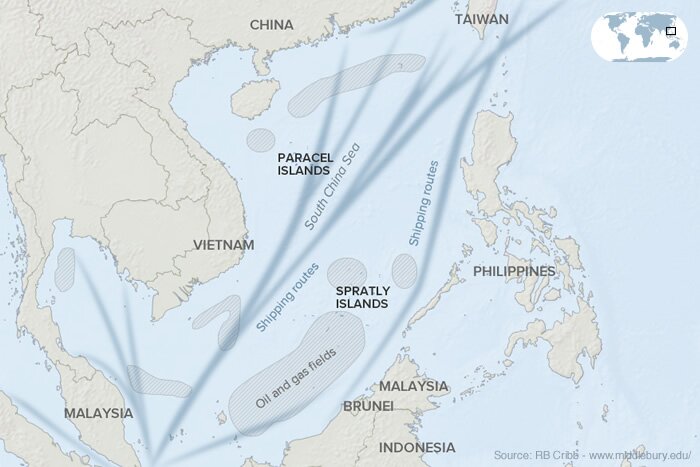 |
Rich in resources and traversed by a quarter of global shipping, the South China Sea is the stage for several territorial disputes that threaten to escalate tensions in the region.
At the heart of these disputes are a series of barren islands in two groups – the Spratly Islands, off the coast of the Philippines, and the Paracel Islands, off the coasts of Vietnam and China. |
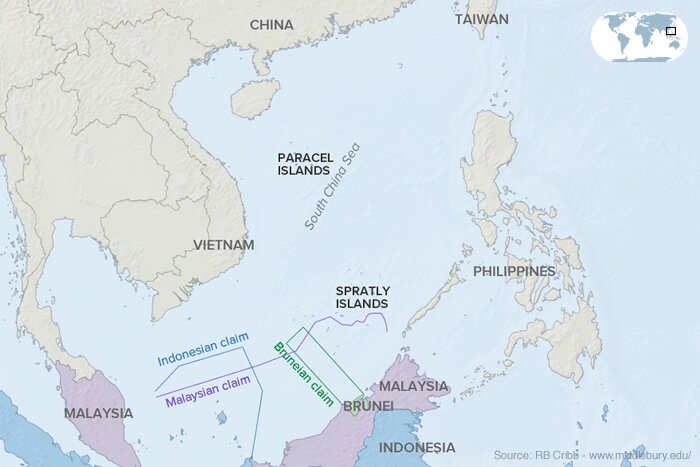 |
Both chains are essentially uninhabitable, but are claimed by no fewer than seven countries, eager to gain control of the vast oil and gas fields below them, as well as some of the region’s best fishing grounds.
Indonesia, Malaysia and Brunei have made claims to part of the Spratlys based on the internationally recognised Exclusive Economic Zone (EEZ), which extends 200 hundred nautical miles from a country’s coastline. |
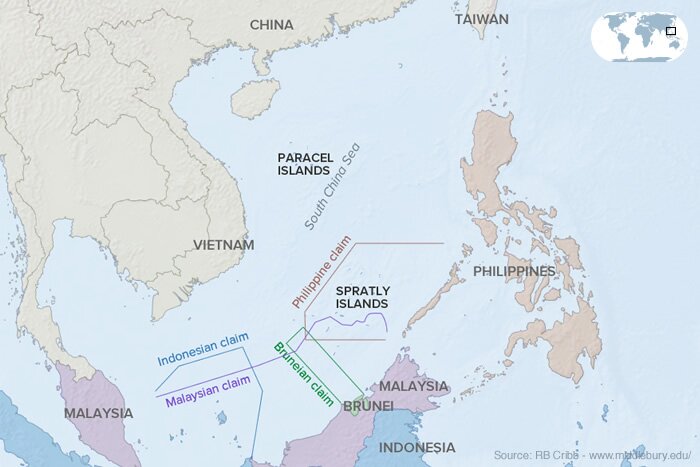 |
Based on the EEZ, the Philippines has the strongest claim on the Spratlys and their resources, with its EEZ covering much of the area.
However the lure of resources, and prospect of exerting greater control over shipping in the region, means that greater powers are contesting the Philippines’ claims. |
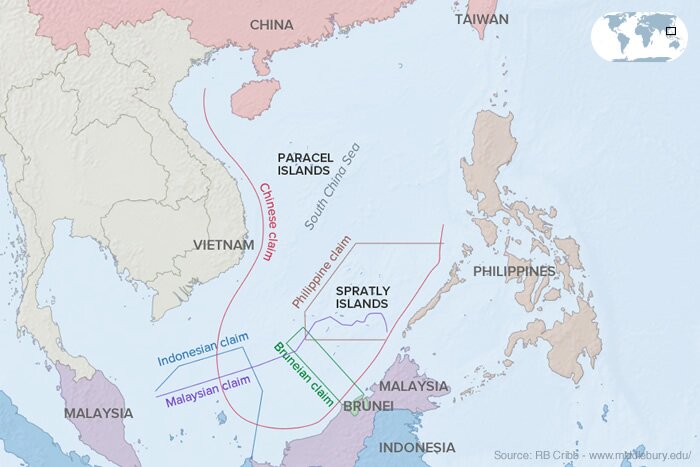 |
China has made extensive sovereignty claims on both the Spratlys and the Paracels to the north, based largely on historic claims outlined in a map from the middle part of the 20th Century known as the ‘Nine Dash Map’.
Taiwan also makes claims based on the same map, as it was created by the nationalist Kuomintang government, which fled to Taiwan after the communists seized power in China. |
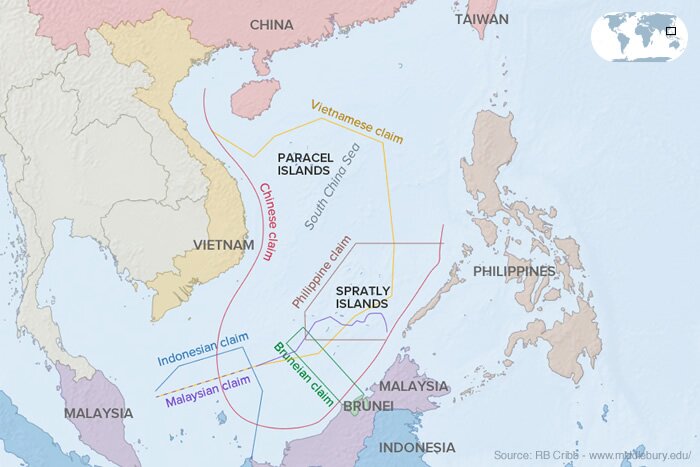 |
Vietnam also claims the Spratlys and the Paracels as sovereign territory, extending Vietnam’s EEZ across much of the region and bringing it into direct conflict with China.
There have been deadly protests in Vietnam over China’s decision to build an oil rig off the Paracels. One Chinese worker in Vietnam was killed and a dozen injured in riots targeting Chinese and Taiwanese owned factories, prompting 3,000 Chinese nationals to flee the country. |
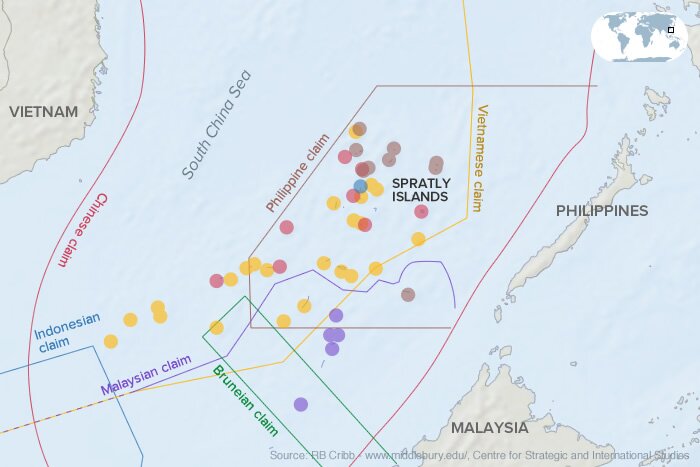 |
EEZ can only be imposed based on boundaries of inhabitable land, and this has prompted all the countries making claims on the region to station personnel, and in some cases build military bases out of the water, to bolster their claim.
Building and protecting these structures has resulted in a series of stand-offs between countries in the region, each with the potential to escalate. China has been leading the charge with these installations, and has deployed vessels to the region to protect their interests. Chinese coast guard vessels have used a water cannon on Vietnamese vessels, as well as blockading an island where the Philippines has deployed military personnel. |
Obama urges ‘peaceful, legal’ resolution to maritime disputes
White House officials have said Mr Obama would deliver a tough message to China that disputes over the South China Sea must be resolved peacefully and not by bullying.
“Here at this summit, we can advance our shared vision of a regional order where international rules and norms, including freedom of navigation, are upheld and where disputes are resolved through peaceful, legal means,” Mr Obama said.
The challenge may be to get all ASEAN countries to agree on a strong statement on the issue.
Officials say China has put pressure on countries such as Cambodia and Laos not to sign on.
“I’m … confident that our shared commitment to upholding these norms will be reinforced,” Ms Rice said.
China’s role in the region hung over the meeting.
Ms Rice said she expected China would support new international sanctions on North Korea for its recent rocket launches.
Advocacy group Human Rights Watch urged the Obama administration to object to human rights violations in countries such as Cambodia and Thailand during the summit.
The President touched on the issue without specifics during his remarks.
“Here at the summit, we can reaffirm that strong, prosperous and inclusive societies require good governance, rule of law, accountable institutions, vibrant civil societies and upholding human rights,” he said.
Combating climate change and cooperating on counter-terrorism and the fight against Islamic State militants were also on the agenda.
Reuters
Topics: world-politics, territorial-disputes, united-states, china, asia




